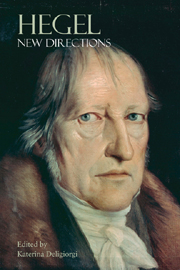Book contents
- Frontmatter
- Contents
- Contributors
- Acknowledgements
- Abbreviations
- Introduction: On reading Hegel today
- 1 Hegel on conscience and the history of moral philosophy
- 2 The apperceptive I and the empirical self: towards a heterodox reading of “Lordship and Bondage” in Hegel's Phenomenology
- 3 Hegel, McDowell and recent defences of Kant
- 4 Substance, subject and infinity: a case study of the role of logic in Hegel's system
- 5 Dialectic as logic of transformative processes
- 6 Hegel, ethics and the logic of universality
- 7 Recognition and reconciliation: actualized agency in Hegel's Jena Phenomenology
- 8 The contemporary relevance of Hegel's practical philosophy
- 9 Catching up with history: Hegel and abstract painting
- 10 New directions in Hegel's philosophy of nature
- 11 Hegel and the gospel according to Immanuel
- 12 What is conceptual history?
- 13 On Hegel's interpretation of Aristotle's psyche: a qualified defence
- Bibliography
- Index
6 - Hegel, ethics and the logic of universality
- Frontmatter
- Contents
- Contributors
- Acknowledgements
- Abbreviations
- Introduction: On reading Hegel today
- 1 Hegel on conscience and the history of moral philosophy
- 2 The apperceptive I and the empirical self: towards a heterodox reading of “Lordship and Bondage” in Hegel's Phenomenology
- 3 Hegel, McDowell and recent defences of Kant
- 4 Substance, subject and infinity: a case study of the role of logic in Hegel's system
- 5 Dialectic as logic of transformative processes
- 6 Hegel, ethics and the logic of universality
- 7 Recognition and reconciliation: actualized agency in Hegel's Jena Phenomenology
- 8 The contemporary relevance of Hegel's practical philosophy
- 9 Catching up with history: Hegel and abstract painting
- 10 New directions in Hegel's philosophy of nature
- 11 Hegel and the gospel according to Immanuel
- 12 What is conceptual history?
- 13 On Hegel's interpretation of Aristotle's psyche: a qualified defence
- Bibliography
- Index
Summary
It is famously difficult to understand the argument of Hegel's Science of Logic. This difficulty is attested to by Hegel himself in the opening passages of the Logic, in which he draws an analogy between studying logic (the determinations of thought) in isolation from the sciences of nature and spirit, and studying grammar in isolation from knowledge of actual languages. Hegel suggests that just as the “substantial, living value” of grammar becomes evident when it is studied by those already linguistically competent across different natural languages, so the “substantial, living value” of logic will be evident to those already knowledgeable about (experienced in) the realms of nature and spirit (L: 57). This does not mean that logic cannot be grasped in and of itself, but Hegel suggests that any such grasp will be necessarily impoverished:
At first, therefore, logic must indeed be learned as something which one understands and sees into quite well but in which, at the beginning, one feels the lack of scope and depth and a wider significance. It is only after profounder acquaintance with the other sciences that logic ceases to be for subjective spirit a merely abstract universal and reveals itself as the universal which embraces within itself the wealth of the particular.
(L: 58)Having said this, however, in seeming contradiction Hegel goes on to defend the study of logic as such as the ideal route for the education of consciousness into the power of thought itself, “remote from sensuous intuitions and aims, from feelings, from the imagined world of figurate conception” (L: 59).
- Type
- Chapter
- Information
- HegelNew Directions, pp. 105 - 124Publisher: Acumen PublishingPrint publication year: 2006
- 3
- Cited by

